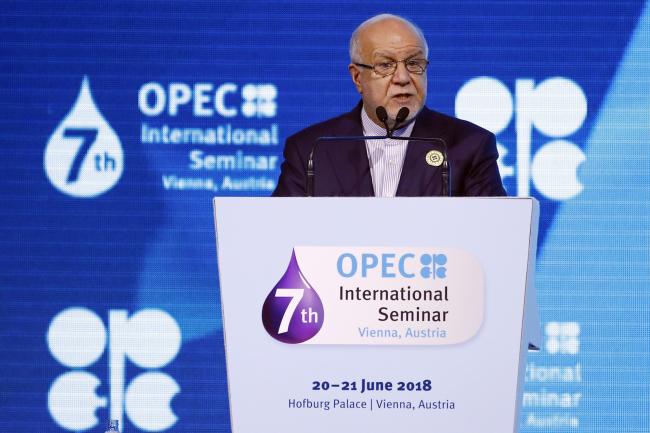(Bloomberg) -- OPEC officials meeting in Vienna raced to salvage an oil-production deal on Wednesday after Iran said it was likely to reject any agreement that raised output from the group.
With two days before OPEC ministers formally meet in Vienna to decide on policy, delegates were in closed-door talks to find a way to boost production and ease consumer anxiety about high oil prices.
Making his first comments after arriving in Vienna, Saudi Oil Minister Khalid Al-Falih said "of course" there’ll be a deal this week.
Iran publicly rejected the idea of a formal output increase late on Tuesday, although the following day the country’s oil minister hinted at one possible route to an agreement. OPEC has a long tradition of last-minute deals, often after phone calls between head of state.
One way of “resolving the situation” would be for all participants in the oil-production cuts to stop exceeding their targets, meaning countries that have been making additional curbs would restore output, Iranian Oil Minister Bijan Namdar Zanganeh said in Vienna. That solution would add very few real barrels to the market, however, because many under-producers, especially Venezuela, are unable to add an extra output.
Another OPEC delegate said on Wednesday that an eventual deal could involve a small increase at this meeting, followed by further discussion in September with a view to adding more output at the end of the year if the market demands it.
OPEC Secretary General Mohammed Barkindo said "I’m confident" the group will have an agreement on Friday.
The talks, held as OPEC hosted an international energy conference gathering hundreds of officials, executives and investors, will shape oil prices for months to come, affecting anything from energy stocks to currencies of petroleum exporting countries.
In the chandeliered halls of Vienna’s Hofburg palace the oil ministers of Saudi Arabia and the U.A.E. were holding private bilateral meetings with other OPEC members on Wednesday in an effort to thrash out a deal.
"OPEC is listening to consumers,” Bob Dudley, the chief executive of BP (LON:BP) Plc, said on the sidelines of the OPEC conference in Vienna. "They pay attention to consumer nations."
Oil prices surged nearly 75 percent, touching $80 a barrel, after the Organization of Petroleum Exporting Countries and allies such as Russia, Kazakhstan and Mexico agreed to cut production by 1.8 million barrels a day in late 2016. Benchmark Brent crude has slipped back, trading near $75 on Wednesday, as those countries discussed easing their curbs.
Saudi Arabia, under pressure from U.S. President Donald Trump, wants to unwind some of the cuts by engineering a “moderate” supply boost in the second half of the year. Russia is pushing for a larger quota increase of 1.5 million barrels a day, although the details of its proposal suggest a smaller volume of extra oil would actually flow into the market.
Yet Iran has so far rejected any increase, including one compromise mooted in private by some OPEC officials for a 300,000-to-600,000 barrel-a-day hike in the second half of the year. “There’s no need,” Zanganeh said on Tuesday, surrounded by dozens of reporters and television crews.
Trump’s involvement makes it difficult for Tehran to accept compromise. The U.S. president has tweeted twice in the last two months complaining about high oil prices and accusing OPEC of being “at it again.” The tweets have irritated several OPEC countries, notably Iran.
“OPEC is an independent organization, not an organization to receive instruction from President Trump,” Zanganeh said. “OPEC is not part of the Department of Energy of the United States.”
OPEC takes its decisions by unanimity, so an Iranian veto would leave Saudi Arabia with only the option of assembling a coalition of willing countries to bypass Tehran’s opposition. Riyadh could also act unilaterally boosting output, as it did in 2011 after a meeting ended in acrimony without a deal.
“Saudi Arabia will try to reach consensus, but if that fails I think that Riyadh won’t be constrained and they will put the barrels in the market that they deem appropriate,” said Helima Croft, chief commodities strategist at RBC Capital Markets LLC.
